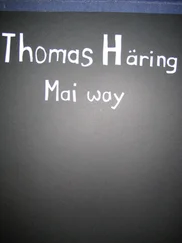Mai Jia - Decoded
Здесь есть возможность читать онлайн «Mai Jia - Decoded» весь текст электронной книги совершенно бесплатно (целиком полную версию без сокращений). В некоторых случаях можно слушать аудио, скачать через торрент в формате fb2 и присутствует краткое содержание. Год выпуска: 2014, Издательство: Allen Lane, Жанр: Современная проза, на английском языке. Описание произведения, (предисловие) а так же отзывы посетителей доступны на портале библиотеки ЛибКат.
- Название:Decoded
- Автор:
- Издательство:Allen Lane
- Жанр:
- Год:2014
- ISBN:нет данных
- Рейтинг книги:3 / 5. Голосов: 1
-
Избранное:Добавить в избранное
- Отзывы:
-
Ваша оценка:
- 60
- 1
- 2
- 3
- 4
- 5
Decoded: краткое содержание, описание и аннотация
Предлагаем к чтению аннотацию, описание, краткое содержание или предисловие (зависит от того, что написал сам автор книги «Decoded»). Если вы не нашли необходимую информацию о книге — напишите в комментариях, мы постараемся отыскать её.
Decoded — читать онлайн бесплатно полную книгу (весь текст) целиком
Ниже представлен текст книги, разбитый по страницам. Система сохранения места последней прочитанной страницы, позволяет с удобством читать онлайн бесплатно книгу «Decoded», без необходимости каждый раз заново искать на чём Вы остановились. Поставьте закладку, и сможете в любой момент перейти на страницу, на которой закончили чтение.
Интервал:
Закладка:
I couldn’t be happier to tell you.
To tell you the truth, I came to learn of this story because of my father’s medical condition. In the spring of 1990, my then 75-year-old father suffered a paralysing stroke and had to be admitted to hospital.
Because treatment proved ineffective, he was transferred to a nursing home in Lingshan County in Guangxi. You could say that this wasn’t really a nursing home, but rather a hospice where the only concern was for the patients to quietly and peacefully wait for death. That winter, I paid a visit to my poor father and discovered that the pain and torment of his condition over the last year had mellowed him enormously. He was much kinder and more loving towards me, and much given to entertaining conversation. It was plain to see that he was hoping that repetition would convince me of his fatherly affection. In all honesty, it wasn’t necessary for him to act in this manner. Both of us already knew that the time for him to show this sort of affection had passed. When I had needed him, he wasn’t there — perhaps he never thought that this day would come, or perhaps there was some other reason: whatever the case may be, I have to admit that he never really loved me as a father should. It did not matter though. I wouldn’t hold it against him now and try to exact some form of revenge. I wouldn’t let it influence my sense of duty concerning how I should love and respect him in his final days. To be honest, I was greatly opposed to having him transferred to this particular nursing home in the first place, but my father had insisted on it most vociferously. I simply couldn’t change his mind. I understood, too, why he was adamant about coming here. He was worried that my wife and I would soon grow to hate having to take care of him day in and day out had he remained closer to home. It was a humiliation that he could do without. Of course, the possibility of this happening was not altogether remote — long-term sickness can weaken the resolve of even the most filial son. Nevertheless, I thought that there could be other possibilities; seeing him bedridden, perhaps we would have sympathized more, become even more filial.
But in all honesty, it was hard to endure listening to my father prattle on about his past embarrassments and regrets. Only when the conversation shifted to the bizarre and odd stories he had heard the other patients tell did I became attentive and eager to hear more. I was especially enthralled by the story of Rong Jinzhen. By the time I visited him, my father was quite familiar with the tale. After all, they shared the same ward — they were practically neighbours. My father told me that Rong Jinzhen had already been a resident of the Lingshan County nursing home for several decades. Without exception, everyone knew him and understood who he was. Upon arrival, every new patient received a special welcoming gift: Rong Jinzhen’s story. Discussing his great talents, the highs and lows of his life, had become the order of the day. Everyone enjoyed talking about him out of reverence and because he was so truly exceptional.
I soon realized that all the patients in the nursing home had the highest regard for Rong Jinzhen. In each and every place he appeared, it didn’t matter where, the people who saw him would immediately stop what they were doing, their gaze fixed upon him. If necessary, they would give way, smiling at him ever so slightly. But in spite of all of this, it is quite likely that Rong Jinzhen was completely oblivious to what happened round him. When the doctors and nurses were with him, the other patients couldn’t help but notice how they would treat him as though he were a member of their own family, or perhaps some senior official. And so it was in this reverential manner that Rong Jinzhen, this clearly mentally handicapped man, lived out his days. In all my life I have never seen anything like it. Only once on television did I see something similar, and that was the care given to Einstein’s British heir, Stephen Hawking.
I spent three days at the nursing home. While I was there, I discovered that during the day the patients were all given some free time to do as they pleased. Some would congregate together and play chess or cards. Some would stroll about, or just sit and chat. The doctors and nurses would eventually appear to perform check-ups or administer medicine. They would, as a rule, blow sharply on their whistles to urge the patients to return to their rooms. Only Rong Jinzhen would always remain in his room, speechless and uncommunicative.
Even for meals and for exercise someone had to go and call on him, otherwise he wouldn’t venture beyond his door. He behaved just as he had in those early days working in Unit 701, holed up in the cryptography room. For this reason, the day-shift nurses were given an additional responsibility: they had to be sure to go and collect Rong Jinzhen for his three daily meals and accompany him for thirty-minute walks after each repast. My father told me that in the beginning, when Rong Jinzhen first arrived at the nursing home, no one knew about his past and so some of the nurses resented giving him this special treatment. As a result, they wouldn’t always perform their duties, and Rong Jinzhen would often go hungry. Later, a very senior official paid a visit to the nursing home and happened to discover the poor treatment he was receiving. He summarily called all the doctors and nurses together and warned them: ‘If you have elderly parents at home, then how you would treat them is how you should treat him; if you have only children at home, then how you would treat your own children is how you should treat him; if you have no family, then treat him exactly as you would treat me.’
Afterwards, the glories and misfortunes of Rong Jinzhen’s life slowly came out, and at the same time the manner in which he was cared for changed. He was now treated as someone to be treasured; no one dared to slight him — they all handled him with the utmost care and respect. My father said that he was sure that if it were not for the nature of the work that he had done, he would have already become a household name, a hero. His miraculous achievements would be eulogized for generation after generation.
I replied, ‘But why should someone’s former profession dictate how he is to be treated at hospital? He should receive that kind of treatment anyway, shouldn’t he?’
‘There is that,’ my father said. ‘But as his outstanding service to the nation was slowly but surely revealed, everyone began to show him greater respect. They all began to dedicate a place in their hearts for him: the man they first saw had disappeared; he was now something so much more.’
In spite of this — in spite of everyone doing as much as possible to look after him — I felt that his life was intolerably difficult, and intolerably sad. At times I would see him through the window, squatting down on a sofa, his face completely blank, his eyes without a glimmer of light — completely unmoving, like a statue. Except for his hands: they never stopped trembling, as if they were being worked upon by some unknown force. In the evenings, through the pale white tranquil walls of the home, I would often hear his old man’s wheeze. It felt as though something or someone was pounding on him unremittingly. Then there were the nights when the stillness of people sleeping would occasionally be interrupted by what sounded like a Chinese oboe weeping ever so mournfully, the sound drifting through the walls. My father told me that Jinzhen made that heartwrenching wailing noise when he dreamed.
One evening in the canteen, I unexpectedly bumped into Rong Jinzhen. He sat in the seat facing me, his back bent, his head low, completely unmoving, just like a. . what was it. . a heap of clothes, a rag doll? He looked rather pitiful; the expression on his face showed the unrelenting and unmerciful passage of time. Silently I stole a look at his face and thought of what my father had said, thought of this man, once young, who had shown so much promise; a special operative of Unit 701 who had distinguished himself with meritorious service, had made exception contributions to the Unit. But now he looked so old, so mentally infirm. The passing of time had been without compassion, it had beaten him down, had turned him into a shell of a man — all that remained were his bones. Just like water wearing down a stone, or a particular phrase becoming crystallized and refined with the passage of time. As dusk fell, he looked so incredibly ancient: a truly ghastly sight, like a centenarian who might take his leave of this world at any time.
Читать дальшеИнтервал:
Закладка:
Похожие книги на «Decoded»
Представляем Вашему вниманию похожие книги на «Decoded» списком для выбора. Мы отобрали схожую по названию и смыслу литературу в надежде предоставить читателям больше вариантов отыскать новые, интересные, ещё непрочитанные произведения.
Обсуждение, отзывы о книге «Decoded» и просто собственные мнения читателей. Оставьте ваши комментарии, напишите, что Вы думаете о произведении, его смысле или главных героях. Укажите что конкретно понравилось, а что нет, и почему Вы так считаете.












